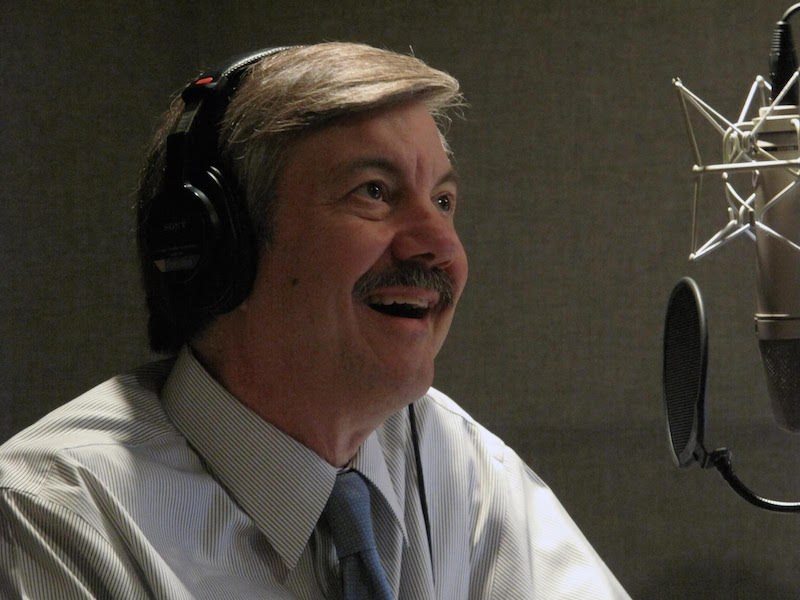
It was luck more than anything that got one of the country’s foremost Washington, D.C. journalists into the news business in the first place.
Ron Elving, senior editor and correspondent at NPR’s Washington Desk, went to Stanford University without giving The Stanford Daily much thought. He got a Master’s in English from the University of Chicago, before returning to California where he sang and played bass in a band called The Shellback Rose.
“I was interested in other things and, generally speaking, just didn’t imagine myself on the school newspaper,” Elving said. “All things recalled, it’s odd.”
The Midwest native gave no consideration to the profession until he did some editing and headline-writing for his undergraduate paper — after he’d graduated. While working on the university’s archives staff, Elving started taking a “lively interest” in The Stanford Daily. That turned into some actual reporting, and soon Elving was applying to the J-School.
“I really wanted to get across the Bay and experience Berkeley,” he said.
Elving caught the politics bug years before he even applied to Stanford. He watched round-the-clock coverage of party nominating conventions in the 1960s and said as a kid he was “sort of a politics junkie.”
A 1978 graduate of the UC Berkeley Graduate School of Journalism, Elving joined the program after being impressed by its first dean, Edwin Bayley, in an interview. He dabbled in print, radio, and television at Cal, including a weekly TV program he helped produced.
“I just had what I would call an idealized experience of going to UC Berkeley,” he said. “I mean it was just such a rewarding time.”
One of the most towering figures during Elving’s J-School years was the late Professor James Spaulding, who, to the “newbies in those days,” was “a god, and we were in total fear of him and wanted to please him.”
“It was the classic relationship between a kind-of crusty old news man … and his flock of children,” Elving recalled.
Another source of inspiration was the late Professor Ben Bagdikian, who later went on to become dean of the J-School. Elving described him as “such a special man and such a special figure, really, and a conscience of journalism.”
A J-School internship with The Milwaukee Journal — Bayley’s and Spaulding’s old stomping ground — turned into a permanent job that allowed Elving to move up from local to state politics. He advanced to national politics as the political editor with Congressional Quarterly before a short stint with USA Today. He also penned a book in the 1990s: “Conflict and Compromise: How Congress Makes the Law” — an examination of the legislative branch largely through an analysis of the 1993 Family and Medical Leave Act.
From a journalistic standpoint, the most difficult stretch of Elving’s career came 15 years ago during the run-up to the Iraq War, as media organizations were assessing the assertions of the Bush administration that Iraqi leader Saddam Hussein was aggressively developing strategic weapons of mass destruction — chemical, biological, and nuclear.
Elving recalled that the journalism community had its concerns about the White House’s statements but, amid widespread, post-9/11 fear and anxiety, did not push back sufficiently.
“I think that was a story in which we did not do our best work,” he said. “I think that was a very difficult time for many of us — in the business in general, but certainly NPR.”
Elving described a contemporary challenge testing his industry’s approach to calling out power: President Donald Trump. With a personality “not seen before at these levels of American politics,” Elving said journalists have had to strengthen the language they use to describe some of Trump’s statements just to match the magnitude of their falsity.
To say Elving is merely liked and admired by his peers is crazy. The guy is beloved out there. Alum Tamara Keith (‘01), White House Correspondent and Host of the NPR Politics Podcast says he’s “a national treasure. He brings such deep knowledge about our political system and American political history and yet none of the calcified cynicism that usually takes hold after a few years covering congress and the president. It makes me happy every time we sit down in the studio to tape our podcast, because I know he’s going to surprise me, make me laugh and make us all smarter.”
Elving, has been the go-to politics reporter for NPR for nearly two decades and is an executive in residence at American University’s School of Communication, where he teaches courses in voting behavior and the news media’s influence on history.
How does one balance both the insanely time-consuming jobs of being a national politics reporter and teaching? Elving said it comes from always living on the clock as the Washington desk manager, and careful time management. But then he paused to reconsider.
“If you enjoy all this as much as I do,” he said, “it just doesn’t seem like work.”
By Sam Goldman (’19)
